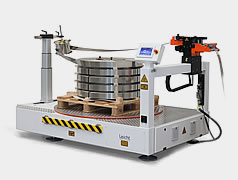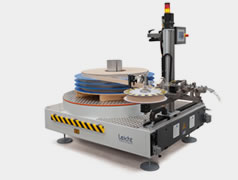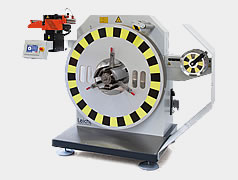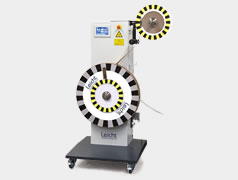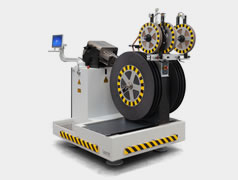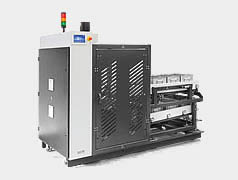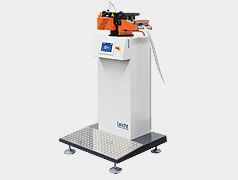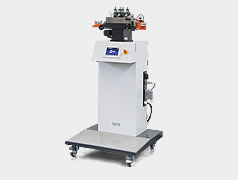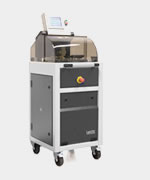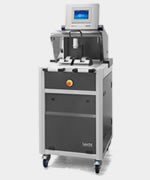Data protection
Data protection
Thank you for your interest in our company. Data protection is of a particularly high priority for the management of Leicht Stanzautomation GmbH. Use of the Leicht Stanzautomation GmbH website is basically possible without providing any personal data. However, if a data subject wishes to make use of our company's special services via our website, it may be necessary to process personal data. If the processing of personal data is necessary and there is no legal basis for such processing, we generally obtain the consent of the person concerned.
The processing of personal data, for example the name, address, email address or telephone number of a data subject, is always carried out in accordance with the General Data Protection Regulation and in accordance with the country-specific data protection regulations applicable to Leicht Stanzautomation GmbH. By means of this data protection declaration, our company would like to inform the public about the type, scope and purpose of the personal data collected, used and processed by us. Furthermore, data subjects are informed about their rights by means of this data protection declaration.
As the controller, Leicht Stanzautomation GmbH has implemented numerous technical and organizational measures to ensure the most complete protection of personal data processed through this website. However, Internet-based data transmissions can generally have security gaps, so that absolute protection cannot be guaranteed. For this reason, every person concerned is free to transmit personal data to us in alternative ways, for example by telephone.
1. Definitions
The data protection declaration of Leicht Stanzautomation GmbH is based on the terms used by the European legislator for directives and regulations when the General Data Protection Regulation (GDPR) was adopted. Our data protection declaration should be easy to read and understand for the public as well as for our customers and business partners. To ensure this, we would like to explain the terms used in advance.
We use the following terms in this data protection declaration:
a) personal data
Personal data is all information that relates to an identified or identifiable natural person (hereinafter “data subject”). A natural person is considered to be identifiable who, directly or indirectly, in particular by means of assignment to an identifier such as a name, to an identification number, to location data, to an online identifier or to one or more special characteristics that express the physical, physiological, genetic, psychological, economic, cultural or social identity of this natural person can be identified.
b) data subject
b) betroffene Person
Affected person is any identified or identifiable natural person whose personal data is processed by the person responsible for processing.
Processing
Processing is any process carried out with or without the help of automated procedures or any such series of processes in connection with personal data such as the collection, recording, organization, sorting, storage, adaptation or modification, reading, querying, use, Disclosure through transmission, dissemination or any other form of provision, comparison or linking, restriction, deletion or destruction.
Restriction of processing
Restriction of processing is the marking of stored personal data with the aim of restricting their future processing.
e) Profiling
Profiling is any type of automated processing of personal data that consists of using this personal data to evaluate certain personal aspects that relate to a natural person, in particular aspects relating to work performance, economic situation, health, personal To analyze or predict the preferences, interests, reliability, behavior, whereabouts or relocation of this natural person.
Pseudonymization
Pseudonymization is the processing of personal data in a way in which the personal data can no longer be assigned to a specific data subject without the use of additional information, provided that this additional information is stored separately and is subject to technical and organizational measures that guarantee that the personal data cannot be assigned to an identified or identifiable natural person.
g) controller or controller
g) Verantwortlicher oder für die Verarbeitung Verantwortlicher
The person responsible or responsible for the processing is the natural or legal person, authority, institution or other body that alone or jointly with others decides on the purposes and means of processing personal data. If the purposes and means of this processing are specified by Union law or the law of the member states, the person responsible or the specific criteria for his appointment can be provided for in accordance with Union law or the law of the member states.
Processor
Processor is a natural or legal person, authority, institution or other body that processes personal data on behalf of the person responsible.
Receiver
Recipient is a natural or legal person, authority, institution or other body to which personal data is disclosed, regardless of whether it is a third party or not. Authorities that may receive personal data as part of a specific investigation under Union law or the law of the member states are not considered recipients.
Third
A third party is a natural or legal person, public authority, agency or body other than the data subject, the person responsible, the processor and the persons who are authorized to process the personal data under the direct responsibility of the person responsible or the processor.
Consent
Consent is any voluntary, informed and unambiguous declaration of intent given by the person concerned for the specific case in the form of a declaration or some other unequivocal affirmative action with which the person concerned indicates that they consent to the processing of their personal data is.
2. Name and address of the person responsible for processing
The person responsible within the meaning of the General Data Protection Regulation, other data protection laws applicable in the member states of the European Union and other provisions of a data protection nature is
Leicht Stanzautomation GmbH
Werner-Heisenberg-Straße 4
75248 Ölbronn-Dürrn
Germany
Tel.: +49 7237 99580-0
E-Mail: leicht@stanzautomation.de
Website: www.stanzautomation.de
3. Name and address of the data protection officer
The data protection officer of the controller is:
Alexis Steppat
Secment & Sia GmbH
Käfertaler Str. 11
68519 Viernheim
Germany
Phone: +49 6204 9802950
E-Mail: datenschutz@secment.de
Website: www.secment.de
Any person concerned can contact our data protection officer directly at any time with any questions or suggestions regarding data protection.
4. Cookies
Die Internetseiten der Leicht Stanzautomation GmbH verwenden Cookies. Cookies sind Textdateien, welche über einen Internetbrowser auf einem Computersystem abgelegt und gespeichert werden.
Zahlreiche Internetseiten und Server verwenden Cookies. Viele Cookies enthalten eine sogenannte Cookie-ID. Eine Cookie-ID ist eine eindeutige Kennung des Cookies. Sie besteht aus einer Zeichenfolge, durch welche Internetseiten und Server dem konkreten Internetbrowser zugeordnet werden können, in dem das Cookie gespeichert wurde. Dies ermöglicht es den besuchten Internetseiten und Servern, den individuellen Browser der betroffenen Person von anderen Internetbrowsern, die andere Cookies enthalten, zu unterscheiden. Ein bestimmter Internetbrowser kann über die eindeutige Cookie-ID wiedererkannt und identifiziert werden.
By using cookies, Leicht Stanzautomation GmbH can provide the users of this website with more user-friendly services that would not be possible without the cookie setting.
A cookie can be used to optimize the information and offers on our website in the interests of the user. As already mentioned, cookies enable us to recognize the users of our website. The purpose of this recognition is to make it easier for users to use our website. The user of a website that uses cookies, for example, does not have to re-enter their access data every time they visit the website because this is done by the website and the cookie stored on the user's computer system. Another example is a shopping cart cookie in an online shop. The online shop uses a cookie to remember the items that a customer has placed in the virtual shopping cart.
The person concerned can prevent the setting of cookies by our website at any time by means of a corresponding setting in the Internet browser used and thus permanently object to the setting of cookies. Furthermore, cookies that have already been set can be deleted at any time via an Internet browser or other software programs. This is possible in all common internet browsers. If the person concerned deactivates the setting of cookies in the internet browser used, not all functions of our website may be fully usable.
5. Collection of general data and information
The Leicht Stanzautomation GmbH website collects a range of general data and information each time the website is accessed by a data subject or an automated system. These general data and information are stored in the server's log files. The (1) browser types and versions used, (2) the operating system used by the accessing system, (3) the website from which an accessing system reaches our website (so-called referrer), (4) the sub-websites that are accessed via an accessing system on our website can be controlled, (5) the date and time of access to the website, (6) an internet protocol address (IP address), (7) the internet service provider of the accessing system and (8) other similar data and information that serve to avert danger in the event of attacks on our information technology systems.
When using this general data and information, Leicht Stanzautomation GmbH does not draw any conclusions about the person concerned. Rather, this information is required to (1) correctly deliver the content of our website, (2) optimize the content of our website and the advertising for it, (3) ensure the long-term functionality of our information technology systems and the technology of our website and ( 4) to provide law enforcement authorities with the information necessary for law enforcement in the event of a cyber attack. These anonymously collected data and information are therefore statistically evaluated by Leicht Stanzautomation GmbH on the one hand and furthermore with the aim of increasing data protection and data security in our company in order to ultimately ensure an optimal level of protection for the personal data processed by us. The anonymous data in the server log files are stored separately from all personal data provided by a data subject.
6. Contact option via the website
Due to legal regulations, the Leicht Stanzautomation GmbH website contains information that enables quick electronic contact to our company and direct communication with us, which also includes a general address for so-called electronic mail (e-mail address). If a person concerned contacts the person responsible for processing by email or a contact form, the personal data transmitted by the person concerned will be automatically saved.
Such personal data transmitted on a voluntary basis by a data subject to the person responsible for processing are stored for the purpose of processing or contacting the data subject. This personal data is not passed on to third parties.
7. Routine deletion and blocking of personal data
Due to legal regulations, the Leicht Stanzautomation GmbH website contains information that enables quick electronic contact to our company and direct communication with us, which also includes a general address for so-called electronic mail (e-mail address). If a person concerned contacts the person responsible for processing by email or a contact form, the personal data transmitted by the person concerned will be automatically saved.
8. Rechte der betroffenen Person
a) Rights of the data subject
Every person concerned has the right granted by the European directive and regulation giver to request confirmation from the person responsible for the processing as to whether personal data concerning them are being processed. If a person concerned wishes to exercise this right to confirmation, they can contact an employee of the person responsible for processing at any time.
b) Right to information
- Every person affected by the processing of personal data has the right, granted by the European legislator of directives and regulations, to receive free information about the personal data stored about him and a copy of this information from the person responsible for the processing at any time. Furthermore, the European directives and regulations grant the data subject access to the following information:
- the processing purposes
- the categories of personal data that are processed
the recipients or categories of recipients to whom the personal data have been disclosed or are still being disclosed, in particular to recipients in third countries or to international organizations
the recipients or categories of recipients to whom the personal data have been disclosed or are still being disclosed, in particular to recipients in third countries or to international organizations - if possible, the planned duration for which the personal data will be stored or, if this is not possible, the criteria for determining this duration
- the existence of a right to correction or deletion of personal data concerning you or to restriction of processing by the person responsible or a right to object to this processing
- the existence of a right of appeal to a supervisory authority
if the personal data are not collected from the data subject: All available information on the origin of the data
wenn die personenbezogenen Daten nicht bei der betroffenen Person erhoben werden: Alle verfügbaren Informationen über die Herkunft der Daten - the existence of a right of appeal to a supervisory authority if the personal data are not collected from the data subject: All available information on the origin of the data
Furthermore, the data subject has a right to information as to whether personal data has been transmitted to a third country or to an international organization. If this is the case, the data subject has the right to receive information about the appropriate guarantees in connection with the transmission.
If a person concerned wishes to exercise this right to information, they can contact an employee of the person responsible for processing at any time.
c) Right to rectification
Every person affected by the processing of personal data has the right granted by the European legislator of directives and regulations to request the immediate correction of incorrect personal data concerning them. Furthermore, the data subject has the right, taking into account the purposes of the processing, to request the completion of incomplete personal data - including by means of a supplementary declaration.
Möchte eine betroffene Person dieses Berichtigungsrecht in Anspruch nehmen, kann sie sich hierzu jederzeit an einen Mitarbeiter des für die Verarbeitung Verantwortlichen wenden.
d) Right to erasure (right to be forgotten)
Every person affected by the processing of personal data has the right granted by the European legislator of directives and regulations to demand that the person responsible delete the personal data concerning them immediately, provided that one of the following reasons applies and insofar as the processing is not necessary:
The personal data were collected or otherwise processed for such purposes for which they are no longer necessary.
The data subject revokes their consent, on which the processing was based in accordance with Art. 6 Paragraph 1 Letter a GDPR or Art. 9 Paragraph 2 Letter a GDPR, and there is no other legal basis for the processing.
The data subject objects to the processing in accordance with Art. 21 Paragraph 1 GDPR, and there are no overriding legitimate reasons for the processing, or the data subject objects in accordance with Art. 21 Paragraph 2 GDPR to the Processing a.
The personal data was processed unlawfully.
The deletion of personal data is necessary to fulfill a legal obligation under Union law or the law of the member states to which the person responsible is subject.
The personal data was collected in relation to the information society services offered in accordance with Art. 8 Para. 1 GDPR.
Die betroffene Person widerruft ihre Einwilligung, auf die sich die Verarbeitung gemäß Art. 6 Abs. 1 Buchstabe a DS-GVO oder Art. 9 Abs. 2 Buchstabe a DS-GVO stützte, und es fehlt an einer anderweitigen Rechtsgrundlage für die Verarbeitung.
Die betroffene Person legt gemäß Art. 21 Abs. 1 DS-GVO Widerspruch gegen die Verarbeitung ein, und es liegen keine vorrangigen berechtigten Gründe für die Verarbeitung vor, oder die betroffene Person legt gemäß Art. 21 Abs. 2 DS-GVO Widerspruch gegen die Verarbeitung ein.
Die personenbezogenen Daten wurden unrechtmäßig verarbeitet.
Die Löschung der personenbezogenen Daten ist zur Erfüllung einer rechtlichen Verpflichtung nach dem Unionsrecht oder dem Recht der Mitgliedstaaten erforderlich, dem der Verantwortliche unterliegt.
Die personenbezogenen Daten wurden in Bezug auf angebotene Dienste der Informationsgesellschaft gemäß Art. 8 Abs. 1 DS-GVO erhoben.
If one of the above-mentioned reasons applies and a data subject wishes to have personal data stored at Leicht Stanzautomation GmbH deleted, they can contact an employee of the person responsible for processing at any time. The Leicht Stanzautomation GmbH employee will arrange for the deletion request to be complied with immediately.
If the personal data has been made public by Leicht Stanzautomation GmbH and our company, as the person responsible, is obliged to delete the personal data in accordance with Art. 17 Paragraph 1 GDPR, Leicht Stanzautomation GmbH will take appropriate measures, taking into account the available technology and the implementation costs , also of a technical nature, to inform other data processors who process the published personal data that the data subject has requested the deletion of all links to this personal data or copies or replications of these other data processors has requested personal data insofar as the processing is not necessary. The Leicht Stanzautomation GmbH employee will arrange the necessary in individual cases.
e) Right to restriction of processing
Every person affected by the processing of personal data has the right, granted by the European legislator of directives and regulations, to require the controller to restrict processing if one of the following conditions is met:
The correctness of the personal data is contested by the data subject for a period that enables the person responsible to check the correctness of the personal data.
The processing is unlawful, the person concerned refuses to delete the personal data and instead requests that the use of the personal data be restricted.
The person responsible no longer needs the personal data for the purposes of processing, but the person concerned needs them to assert, exercise or defend legal claims.
The data subject has an objection to the processing acc. Art. 21 para. 1 GDPR and it has not yet been determined whether the legitimate reasons of the person responsible outweigh those of the person concerned.
Die Richtigkeit der personenbezogenen Daten wird von der betroffenen Person bestritten, und zwar für eine Dauer, die es dem Verantwortlichen ermöglicht, die Richtigkeit der personenbezogenen Daten zu überprüfen.
Die Verarbeitung ist unrechtmäßig, die betroffene Person lehnt die Löschung der personenbezogenen Daten ab und verlangt stattdessen die Einschränkung der Nutzung der personenbezogenen Daten.
Der Verantwortliche benötigt die personenbezogenen Daten für die Zwecke der Verarbeitung nicht länger, die betroffene Person benötigt sie jedoch zur Geltendmachung, Ausübung oder Verteidigung von Rechtsansprüchen.
Die betroffene Person hat Widerspruch gegen die Verarbeitung gem. Art. 21 Abs. 1 DS-GVO eingelegt und es steht noch nicht fest, ob die berechtigten Gründe des Verantwortlichen gegenüber denen der betroffenen Person überwiegen.
If one of the above conditions is met and a person concerned would like to request the restriction of personal data stored at Leicht Stanzautomation GmbH, they can contact an employee of the person responsible for processing at any time. The Leicht Stanzautomation GmbH employee will arrange for the processing to be restricted.
f) Right to data portability
Every person affected by the processing of personal data has the right granted by the European legislator of directives and regulations to receive the personal data concerning them, which have been made available to a person responsible by the person concerned, in a structured, common and machine-readable format. You also have the right to transfer this data to another person responsible without hindrance from the person responsible to whom the personal data was provided, provided that the processing is based on the consent in accordance with Art. 6 Para. 1 Letter a GDPR or Art. 9 Para . 2 letter a DS-GVO or on a contract according to Art. 6 para. 1 letter b DS-GVO and the processing is carried out with the aid of automated procedures, unless the processing is necessary for the performance of a task that is in the public interest or takes place in the exercise of public authority, which has been assigned to the person responsible.
Furthermore, when exercising their right to data portability in accordance with Art. 20 (1) GDPR, the data subject has the right to have the personal data transmitted directly from one person responsible to another, insofar as this is technically feasible and provided this does not affect the rights and freedoms of other persons.
To assert the right to data portability, the person concerned can contact an employee of Leicht Stanzautomation GmbH at any time.
g) Right to object
Every person affected by the processing of personal data has the right granted by the European legislator of directives and regulations to object at any time to the processing of personal data relating to them, which is based on Art. 6 Para. 1 Letter e or f DS-GVO takes place to object. This also applies to profiling based on these provisions.
Leicht Stanzautomation GmbH will no longer process the personal data in the event of an objection, unless we can prove compelling legitimate reasons for the processing that outweigh the interests, rights and freedoms of the data subject, or the processing serves to assert, exercise or Defense of legal claims.
If Leicht Stanzautomation GmbH processes personal data in order to operate direct mail, the data subject has the right to object at any time to the processing of personal data for the purpose of such advertising. This also applies to profiling insofar as it is related to such direct advertising. If the data subject objects to Leicht Stanzautomation GmbH processing for direct marketing purposes, Leicht Stanzautomation GmbH will no longer process the personal data for these purposes.
In addition, the data subject has the right, for reasons that arise from their particular situation, to object to the processing of personal data concerning them that is carried out by Leicht Stanzautomation GmbH for scientific or historical research purposes or for statistical purposes in accordance with Art. 89 Para. 1 DS -GVO take an objection, unless such processing is necessary to fulfill a task in the public interest.
To exercise the right to object, the person concerned can contact any employee of Leicht Stanzautomation GmbH or another employee directly. The data subject is also free, in connection with the use of information society services, regardless of Directive 2002/58 / EC, to exercise their right of objection by means of automated procedures in which technical specifications are used.
h) Automated decisions in individual cases including profiling
Any person affected by the processing of personal data has the right granted by the European legislator of directives and regulations not to be subjected to a decision based solely on automated processing - including profiling - which has legal effects on them or which significantly affects them in a similar manner, provided that the decision (1) is not necessary for the conclusion or performance of a contract between the data subject and the person responsible, or (2) is permissible on the basis of Union or Member State law to which the person responsible is subject and these legal provisions take appropriate measures to safeguard the rights and freedoms as well as the legitimate interests of the data subject or (3) is made with the express consent of the data subject.
If the decision (1) is necessary for the conclusion or performance of a contract between the data subject and the person responsible or (2) it is made with the express consent of the data subject, Leicht Stanzautomation GmbH will take appropriate measures to safeguard the rights and freedoms and the to protect the legitimate interests of the data subject, including at least the right to obtain intervention by a person on the part of the person responsible, to express his or her own position and to contest the decision.
If the data subject wishes to assert rights with regard to automated decisions, they can contact an employee of the controller at any time.
i) Right to withdraw consent under data protection law
Any person affected by the processing of personal data has the right granted by the European legislator of directives and regulations to revoke consent to the processing of personal data at any time.
If the data subject wishes to assert their right to withdraw consent, they can contact an employee of the person responsible for processing at any time.
9. Data protection in applications and in the application process
The person responsible for processing collects and processes the personal data of applicants for the purpose of handling the application process. The processing can also be done electronically. This is particularly the case if an applicant sends the relevant application documents electronically, for example by e-mail or via a web form on the website, to the person responsible for processing. If the person responsible for processing concludes an employment contract with an applicant, the data transmitted will be stored for the purpose of processing the employment relationship in compliance with the statutory provisions.
If the person responsible for processing does not conclude an employment contract with the applicant, the application documents will be automatically deleted two months after notification of the rejection decision, provided that deletion does not conflict with any other legitimate interests of the person responsible for processing. Another legitimate interest in this sense is, for example, a burden of proof in proceedings under the General Equal Treatment Act (AGG).
10. Data protection provisions on the application and use of Google Analytics (with anonymization function)
The person responsible for processing has integrated the Google Analytics component (with anonymization function) on this website. Google Analytics is a web analysis service. Web analysis is the collection, collection and evaluation of data on the behavior of visitors to Internet pages. A web analysis service collects, among other things, data on which website a person concerned came to a website (so-called referrer), which sub-pages of the website were accessed or how often and for how long a sub-page was viewed. A web analysis is mainly used to optimize a website and for the cost-benefit analysis of Internet advertising.
The operating company of the Google Analytics component is Google Inc., 1600 Amphitheater Pkwy, Mountain View, CA 94043-1351, USA.
The person responsible for processing uses the addition "_gat._anonymizeIp" for web analysis via Google Analytics. By means of this addition, the IP address of the Internet connection of the person concerned is shortened and anonymized by Google if our Internet pages are accessed from a member state of the European Union or from another state party to the Agreement on the European Economic Area.
The purpose of the Google Analytics component is to analyze the flow of visitors to our website. Google uses the data and information obtained, among other things, to evaluate the use of our website, to compile online reports for us that show the activities on our website, and to provide other services related to the use of our website.
Google Analytics places a cookie on the information technology system of the person concerned. What cookies are has already been explained above. By setting the cookie, Google is enabled to analyze the use of our website. Every time one of the individual pages of this website is accessed, which is operated by the person responsible for processing and on which a Google Analytics component has been integrated, the Internet browser on the information technology system of the person concerned is automatically triggered by the respective Google Analytics component To transmit data to Google for the purpose of online analysis. As part of this technical process, Google gains knowledge of personal data, such as the IP address of the person concerned, which Google uses, among other things, to track the origin of visitors and clicks and subsequently to enable commission accounting.
The cookie is used to store personal information, such as the access time, the location from which access was made and the frequency of visits to our website by the person concerned. Each time you visit our website, this personal data, including the IP address of the Internet connection used by the person concerned, is transmitted to Google in the United States of America. These personal data are stored by Google in the United States of America. Google may pass this personal data collected through the technical process on to third parties.
The person concerned can prevent the setting of cookies by our website, as already shown above, at any time by means of a corresponding setting in the Internet browser used and thus permanently object to the setting of cookies. Such a setting of the internet browser used would also prevent Google from setting a cookie on the information technology system of the person concerned. In addition, a cookie already set by Google Analytics can be deleted at any time via the Internet browser or other software programs.
Furthermore, the data subject has the option of objecting to the collection of the data generated by Google Analytics relating to the use of this website and the processing of this data by Google, and to prevent this. To do this, the person concerned must download and install a browser add-on under the link https://tools.google.com/dlpage/gaoptout. This browser add-on informs Google Analytics via JavaScript that no data or information on website visits may be transmitted to Google Analytics. The installation of the browser add-on will be considered an objection by Google. If the information technology system of the person concerned is deleted, formatted or reinstalled at a later point in time, the person concerned must reinstall the browser add-on in order to deactivate Google Analytics. If the browser add-on is uninstalled or deactivated by the person concerned or another person who is attributable to their sphere of influence, there is the option of reinstalling or reactivating the browser add-on. https://tools.google.com/dlpage/gaoptout herunterladen und installieren. Dieses Browser-Add-On teilt Google Analytics über JavaScript mit, dass keine Daten und Informationen zu den Besuchen von Internetseiten an Google Analytics übermittelt werden dürfen. Die Installation des Browser-Add-Ons wird von Google als Widerspruch gewertet. Wird das informationstechnologische System der betroffenen Person zu einem späteren Zeitpunkt gelöscht, formatiert oder neu installiert, muss durch die betroffene Person eine erneute Installation des Browser-Add-Ons erfolgen, um Google Analytics zu deaktivieren. Sofern das Browser-Add-On durch die betroffene Person oder einer anderen Person, die ihrem Machtbereich zuzurechnen ist, deinstalliert oder deaktiviert wird, besteht die Möglichkeit der Neuinstallation oder der erneuten Aktivierung des Browser-Add-Ons.
Further information and the applicable data protection provisions of Google can be found at https://www.google.de/intl/de/policies/privacy/ and at http://www.google.com/analytics/terms/de.html. Google Analytics is explained in more detail under this link https://www.google.com/intl/de_de/analytics/. https://www.google.de/intl/de/policies/privacy/ und unter http://www.google.com/analytics/terms/de.html abgerufen werden. Google Analytics wird unter diesem Link https://www.google.com/intl/de_de/analytics/ genauer erläutert.
11. Data protection provisions on the application and use of YouTube
The controller has integrated components from YouTube on this website. YouTube is an Internet video portal that enables video publishers to post video clips free of charge and other users to view, rate and comment on them free of charge. YouTube permits the publication of all types of videos, which is why complete film and television programs, but also music videos, trailers or videos made by users themselves can be accessed via the Internet portal.
YouTube is operated by YouTube, LLC, 901 Cherry Ave., San Bruno, CA 94066, USA. YouTube, LLC is a subsidiary of Google Inc., 1600 Amphitheater Pkwy, Mountain View, CA 94043-1351, USA.
Each time one of the individual pages of this website is accessed, which is operated by the person responsible for processing and on which a YouTube component (YouTube video) has been integrated, the Internet browser on the information technology system of the person concerned is automatically replaced by the respective YouTube component prompts you to download a representation of the corresponding YouTube component from YouTube. Further information about YouTube can be found at https://www.youtube.com/yt/about/de/. As part of this technical process, YouTube and Google gain knowledge of which specific subpage of our website is visited by the person concerned. https://www.youtube.com/yt/about/de/ abgerufen werden. Im Rahmen dieses technischen Verfahrens erhalten YouTube und Google Kenntnis darüber, welche konkrete Unterseite unserer Internetseite durch die betroffene Person besucht wird.
If the person concerned is logged into YouTube at the same time, YouTube recognizes which specific sub-page of our website the person concerned is visiting by calling up a subpage that contains a YouTube video. This information is collected by YouTube and Google and assigned to the respective YouTube account of the person concerned.
YouTube and Google always receive information via the YouTube component that the person concerned has visited our website if the person concerned is logged in to YouTube at the same time as accessing our website; this takes place regardless of whether the person concerned clicks on a YouTube video or not. If the person concerned does not want this information to be transmitted to YouTube and Google, they can prevent the transmission by logging out of their YouTube account before calling up our website.
The data protection regulations published by YouTube, which are available at https://www.google.de/intl/de/policies/privacy/, provide information about the collection, processing and use of personal data by YouTube and Google. https://www.google.de/intl/de/policies/privacy/ abrufbar sind, geben Aufschluss über die Erhebung, Verarbeitung und Nutzung personenbezogener Daten durch YouTube und Google.
12. The data protection regulations published by YouTube, which are available at https://www.google.de/intl/de/policies/privacy/, provide information about the collection, processing and use of personal data by YouTube and Google.
Art. 6 I lit. a DS-GVO serves our company as the legal basis for processing operations for which we obtain consent for a specific processing purpose. If the processing of personal data is necessary to fulfill a contract to which the data subject is a party, as is the case, for example, with processing operations that are necessary for the delivery of goods or the provision of other services or consideration, the processing is based on Art. 6 I lit. b GDPR. The same applies to processing operations that are necessary to carry out pre-contractual measures, for example in cases of inquiries about our products or services. If our company is subject to a legal obligation which requires the processing of personal data, for example to fulfill tax obligations, the processing is based on Art. 6 I lit. c GDPR. In rare cases, it may be necessary to process personal data in order to protect the vital interests of the data subject or another natural person.
13. Legitimate interests in processing that are being pursued by the controller or a third party
If the processing of personal data is based on Article 6 I lit. f DS-GVO is our legitimate interest in conducting our business for the benefit of all our employees and our shareholders.
14. Duration for which the personal data are stored
The criterion for the duration of the storage of personal data is the respective statutory retention period. After the deadline has expired, the relevant data is routinely deleted, provided that it is no longer required for contract fulfillment or contract initiation.
15. Legal or contractual provisions for the provision of personal data; Necessity for the conclusion of the contract; Obligation of the data subject to provide the personal data; possible consequences of non-provision
We explain to you that the provision of personal data is partly required by law (e.g. tax regulations) or can also result from contractual provisions (e.g. information on the contractual partner). Sometimes it may be necessary for a contract to be concluded that a data subject provides us with personal data Provides data that we subsequently have to process. For example, the person concerned is obliged to provide us with personal data when our company concludes a contract with them.
Failure to provide personal data would mean that the contract could not be concluded with the person concerned. Before the person concerned provides personal data, the person concerned must contact one of our employees. Our employee explains to the person concerned on a case-by-case basis whether the provision of the personal data is required by law or contract or is necessary for the conclusion of the contract, whether there is an obligation to provide the personal data and what consequences the failure to provide the personal data would have.
16. Existence of automated decision-making
As a responsible company, we do not use automatic decision-making or profiling.
This data protection declaration was created by the data protection declaration generator of DGD Deutsche Gesellschaft für Datenschutz GmbH, which acts as the external data protection officer in Bayreuth, in cooperation with the lawyer for IT and data protection law Christian Solmecke. Externer Datenschutzbeauftragter Bayreuth tätig ist, in Kooperation mit dem Anwalt für IT- und Datenschutzrecht Christian Solmecke erstellt.
17. Google reCAPTCHA v3
Diese Website nutzt Google reCAPTCHA Version 3 zur Verhinderung von Spam-Mails.
Weitere Informationen zur Arbeitsweise von Google reCAPTCHA v3 finden Sie hier
Additive:
Plugins of the video portal Vimeo from Vimeo, LLC, 555 West 18th Street, New York, New York 10011, USA are integrated on our website. Each time you visit a page that offers one or more Vimeo video clips, a direct connection is established between your browser and a Vimeo server in the USA. Information about your visit and your IP address are saved there. Through interactions with the Vimeo plugins (e.g. clicking the start button), this information is also transmitted to Vimeo and stored there. The data protection declaration for Vimeo with more detailed information on the collection and use of your data by Vimeo can be found in Vimeo's data protection declaration.
If you have a Vimeo user account and do not want Vimeo to collect data about you via this website and link it to your member data stored by Vimeo, you must log out of Vimeo before visiting this website.
Vimeo also calls up the Google Analytics tracker via an iFrame in which the video is called up. This is Vimeo's own tracking to which we have no access. You can prevent tracking by Google Analytics by using the deactivation tools that Google offers for some Internet browsers. You can also prevent Google from collecting the data generated by Google Analytics and relating to your use of the website (including your IP address) and from processing this data by Google by downloading the browser plug-in available under the following link and install:

